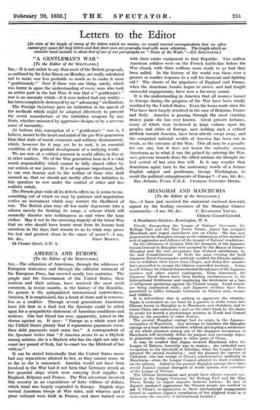Letters to the Editor
[in view of the length. of many of the letters which we receive, we would remind correspondents that we often cannot give space for long letters and that short ones are generally read with more attention. The length which eve consider most suitable is about that of one of our paragraphs on " News of the Week."—Ed. SeacrAzon.I
"A GENTLEMAN'S WAR"
[To the Editor of the SPECTATOR.]
Sra,—It is not unfair to say that most of the British proposals, as outlined by Sir John Simon on Monday, are really calculated not to make war less probable so much as to make it more " gentlemanly." Now if there was one thing, surely, which was burnt in upon the understanding of every man who took an active part in the last War, it was that a " gentleman's " war is an anomaly which—if it ever indeed had any reality— has been completely destroyed by an " advancing " civilization.
The Foreign Secretary gave no indication in his speech of the methods which might be adopted effectively to prevent the secret manufacture of the forbidden weapons by any State, whether animated by aggressive designs or by a nervous sense of insecurity. - At bottom this conception of a " gentlemen's " war is, I believe, nearer to the heart and mind of the pre-War generation than that state of moral, economic and military disarmament, which, however far it may yet be to seek, is an essential condition of the gradual development of a unifying world.
We are now at a critical moment in world affairs in this as in other matters. We of the War generation bear in it a vital moral responsibility which cannot be fully shared either by our seniors or our juniors. It is of supreme importance, both to our own honour and to the welfare of those who shall succeed us, that we should not inertly allow the initiative in this question to rest under the control of other and less realistic minds.
The French plan with all its defects offers us, it seems to me, something out of which we may by patience and negotiation evolve an instrument which may restrict the likelihood of war. The British plan may all too easily degenerate into a scheme merely for limiting its range, a scheme which will assuredly dissolve into nothingness as and when the hour strikes. May it not be the crowning tragedy of the Great War that we who should have learnt most from its lessons lend ourselves in the days that remain to us to what may prove the last and greatest sham in the cause of peace ?—I am,






































 Previous page
Previous page